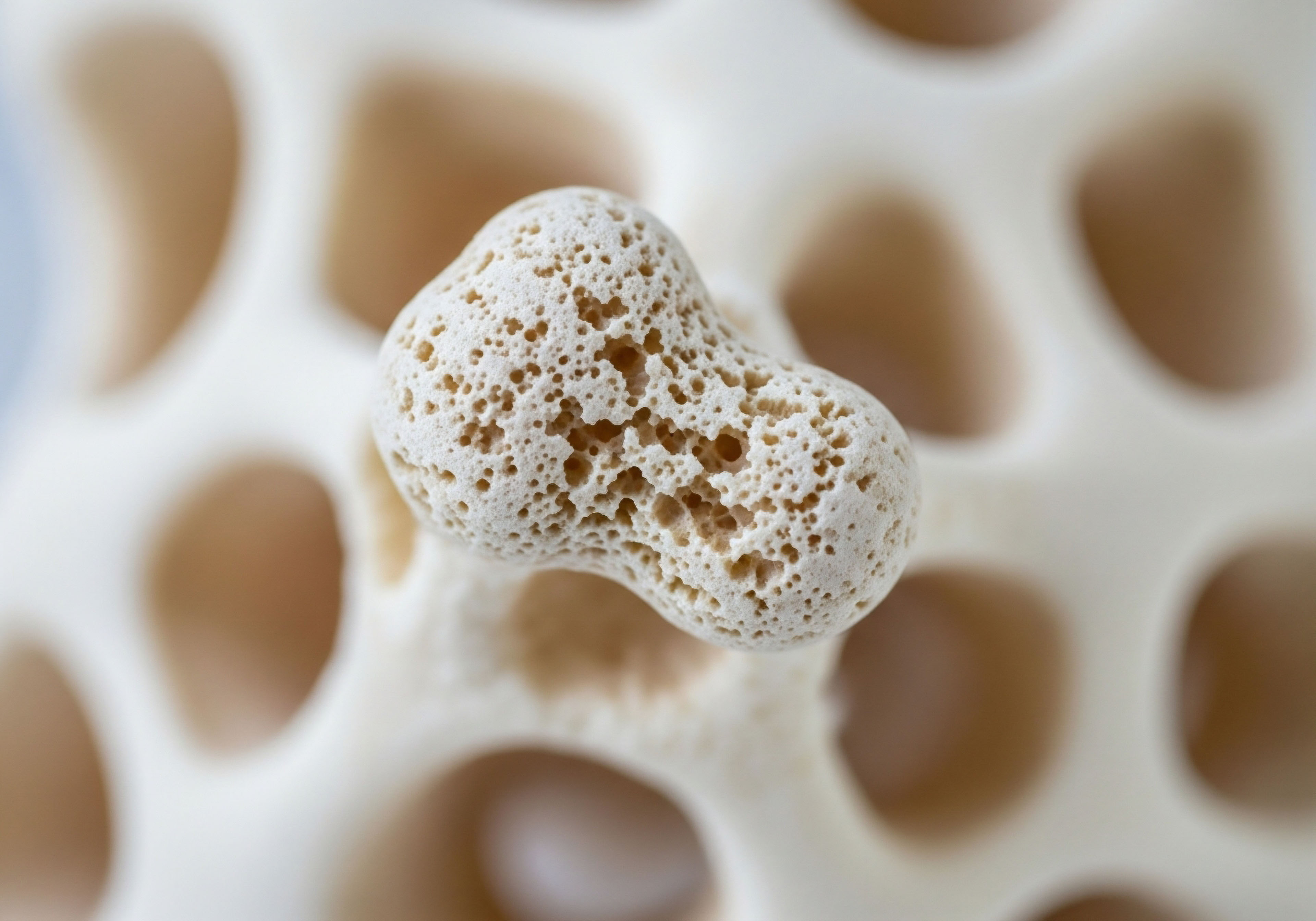

Fundamentals
Have you ever found yourself feeling inexplicably drained, your energy levels diminished, or your mood shifting without a clear reason? Perhaps you have noticed changes in your physical vitality, a lingering sense that something within your body is operating out of sync.
These experiences, often dismissed as simply “getting older” or “just stress,” frequently signal a deeper conversation happening within your biological systems. Your body communicates through a sophisticated network of chemical messengers, and when these signals become distorted, the impact on your daily life can be profound. Understanding these internal communications, particularly those involving your hormonal architecture, is the first step toward reclaiming your sense of well-being.
Many individuals experiencing such shifts eventually explore hormonal optimization protocols, seeking to restore balance and function. These interventions, whether they involve testosterone recalibration or other endocrine system support, offer significant potential for improving quality of life. Yet, the efficacy of these biochemical recalibrations is not solely determined by the prescribed agents themselves.
A critical, often underestimated, dimension lies in the daily choices we make ∞ the lifestyle factors that either support or undermine our body’s innate capacity for equilibrium. Your personal journey toward optimal health is a partnership between targeted clinical support and the consistent cultivation of a supportive internal environment.
Hormonal balance is a dynamic state, continuously influenced by our daily choices and the intricate feedback loops within our biological systems.

The Endocrine System an Internal Messaging Service
Your endocrine system functions as a complex internal messaging service, utilizing specialized glands to produce and release hormones directly into your bloodstream. These hormones act as chemical signals, traveling to target cells and tissues throughout your body, orchestrating a vast array of physiological processes.
Consider the hypothalamic-pituitary-gonadal (HPG) axis, a central regulatory pathway that governs reproductive function and sex hormone production. The hypothalamus, located in your brain, initiates this cascade by releasing gonadotropin-releasing hormone (GnRH). This signal prompts the pituitary gland, often called the “master gland,” to secrete luteinizing hormone (LH) and follicle-stimulating hormone (FSH). These gonadotropins then travel to the gonads ∞ the testes in men and ovaries in women ∞ stimulating the production of testosterone, estrogen, and progesterone.
This intricate feedback loop ensures that hormone levels remain within a narrow, healthy range. When sex steroid levels are high, they signal back to the hypothalamus and pituitary, inhibiting further GnRH, LH, and FSH release. Conversely, low levels stimulate their production, aiming to restore balance.
This system is not isolated; it interacts with other vital axes, such as the hypothalamic-pituitary-adrenal (HPA) axis, which manages your body’s stress response. The interconnectedness of these systems means that a disruption in one area can ripple through others, affecting overall hormonal harmony.

Lifestyle Choices as Biological Modulators
Lifestyle choices are not merely external habits; they are powerful biological modulators that directly influence the production, metabolism, and reception of hormones within your body. Think of your body as a finely tuned instrument. While hormonal optimization protocols provide the necessary tuning adjustments, your lifestyle determines the environment in which that instrument performs.
Poor nutritional intake, insufficient sleep, chronic stress, and inadequate physical activity can create an internal landscape of inflammation and metabolic dysregulation, making it challenging for any hormonal intervention to achieve its full potential.
For instance, the food you consume provides the raw materials for hormone synthesis. A diet lacking essential nutrients can impede the body’s ability to produce hormones effectively. Similarly, sleep is a period of crucial repair and recalibration for your endocrine glands, and chronic sleep deprivation can disrupt the delicate rhythms of hormone release.
Your body’s response to stress, mediated by hormones like cortisol, can also significantly impact sex hormone balance. These daily inputs are not passive; they actively shape your internal biochemistry, influencing how well your body responds to and utilizes any external hormonal support.
Understanding this dynamic relationship empowers you to become an active participant in your health journey. It transforms the concept of “treatment” into a holistic process of systemic support, where every choice contributes to the overarching goal of vitality and optimal function. The journey to hormonal well-being is a collaborative effort between precise clinical guidance and your consistent commitment to nurturing your body’s inherent wisdom.


Intermediate
When considering hormonal optimization protocols, such as testosterone replacement therapy (TRT) for men or women, or targeted peptide therapies, it becomes evident that lifestyle choices are not peripheral considerations. They are integral components that significantly influence the effectiveness and safety of these interventions.
The body’s response to exogenous hormonal support is deeply intertwined with its metabolic state, inflammatory burden, and overall physiological resilience. This section will explore how specific lifestyle domains directly interact with and shape the outcomes of various hormonal recalibration strategies.

Nutrition and Hormonal Optimization Protocols
The food we consume provides the fundamental building blocks for every cellular process, including hormone synthesis and metabolism. For individuals undergoing TRT, a balanced diet is paramount. Key nutrients, including vitamins, minerals, and healthy fats, are essential for optimal hormone production and regulation. Deficiencies in these micronutrients can hinder the effectiveness of testosterone replacement therapy.
Consider the role of specific macronutrients. Adequate protein intake supports muscle repair and growth, which is a primary goal for many men on TRT. Healthy fats, particularly omega-3 fatty acids, are crucial for hormone production, including testosterone. Carbohydrate quality also matters, influencing insulin sensitivity and blood sugar regulation, which in turn affect hormonal balance.
Micronutrients like zinc and vitamin D are directly linked to testosterone synthesis and overall hormonal health. Men with sufficient vitamin D levels often exhibit higher testosterone concentrations. A diet rich in colorful fruits and vegetables provides a broad spectrum of vitamins and minerals, supporting diverse metabolic processes and antioxidant defenses. Conversely, diets high in processed foods and sugar can contribute to inflammation and insulin resistance, potentially diminishing the benefits of hormonal support.
Nutritional choices directly influence hormone synthesis, metabolism, and receptor sensitivity, acting as a foundational pillar for successful hormonal optimization.
A plant-based diet has been shown to benefit erectile function in men over 45, without negatively impacting total testosterone levels. This suggests that dietary patterns can support overall physiological function alongside hormonal interventions.

Exercise and Hormonal Balance
Regular physical activity is a powerful modulator of endocrine function and significantly enhances the effectiveness of hormonal optimization protocols. Exercise helps regulate hormones such as estrogen, testosterone, and insulin, contributing to overall hormonal balance. For men undergoing TRT, exercise, particularly strength training, can significantly increase muscle mass and strength, complementing the effects of testosterone.
Different types of exercise offer distinct benefits:
- Aerobic activities, such as walking, running, or cycling, improve cardiovascular health and aid in hormone regulation. These activities can also alleviate feelings of depression and anxiety often associated with hormonal imbalances.
- Resistance training, including weightlifting, builds muscle mass, boosts testosterone levels, and enhances metabolism.
- Flexibility and balance exercises, like yoga or Pilates, improve physical mobility and mental clarity, supporting stress reduction and hormonal equilibrium.
Exercise also assists in managing potential side effects of hormonal support. Regular physical activity can reduce fatigue and hot flashes, common concerns during hormonal transitions. It improves energy levels, making it easier to cope with the physical demands of therapy, and promotes better sleep quality, which is essential for hormonal balance.
While some studies suggest that exercise alone can improve lean mass and decrease fat mass in postmenopausal women, independent of hormone replacement therapy (HRT), the combined effect of aerobic training and oral HRT may offer additional benefits for certain cardiovascular markers, such as systolic blood pressure.

Sleep Quality and Hormonal Efficacy
Sleep is not merely a period of rest; it is a critical time for hormonal regulation and repair. Poor sleep quality and chronic sleep deprivation can profoundly disrupt the delicate balance of your endocrine system, potentially undermining the benefits of hormonal optimization. Hormones like growth hormone, essential for tissue repair and regeneration, are primarily released during deep sleep, particularly in the first half of the night.
For women experiencing menopausal symptoms, sleep disturbances are common, often linked to hot flashes and night sweats. Studies indicate that low-dose hormonal support can significantly improve sleep quality in recently menopausal women, sometimes doubling the improvement seen in placebo groups. This improvement is often associated with a reduction in vasomotor symptoms, although the precise causal relationship between sleep quality and these symptoms remains an area of ongoing investigation.
The impact of sleep extends beyond sex hormones. Thyroid hormone, which regulates metabolism, and orexin, a neuropeptide controlling wakefulness, are also influenced by sleep patterns. Consistent, high-quality sleep supports the body’s natural rhythms, allowing the endocrine system to function optimally and respond more effectively to therapeutic interventions. Prioritizing 7-9 hours of quality sleep each night, maintaining a consistent sleep schedule, and creating a calming bedtime routine are all crucial steps in supporting hormonal health.

Stress Management and Endocrine Resilience
The intricate relationship between your endocrine system and stress is undeniable. When faced with perceived threats, your brain initiates a cascade of events involving the hypothalamic-pituitary-adrenal (HPA) axis, leading to an increase in stress hormones, primarily cortisol. While this “fight or flight” response is vital for short-term survival, chronic stress can lead to sustained elevation of cortisol, which can disrupt other hormonal pathways.
Elevated cortisol levels can interfere with melatonin production, contributing to sleep issues, and can also impact sex hormone balance. This creates a cyclical pattern where stress affects hormones, which then exacerbate stress responses. Managing stress effectively is therefore crucial for maintaining hormonal balance and enhancing the efficacy of hormonal optimization protocols.
Strategies for stress reduction include:
- Mindfulness practices and meditation for mental focus and relaxation.
- Deep breathing exercises to lower cortisol levels.
- Regular physical activity, which boosts endorphins and reduces anxiety.
- Time management and setting realistic goals to reduce feelings of overwhelm.
These approaches help to modulate the HPA axis, preventing chronic overactivation and supporting the body’s ability to restore hormonal equilibrium. A healthy social support network also contributes to stress resilience, forming a critical building block for a healthy lifestyle.
How do lifestyle choices influence the body’s reception of hormone therapy?


Academic
The effectiveness of hormonal optimization protocols extends beyond the simple administration of exogenous hormones; it is deeply rooted in the complex interplay of biological systems, metabolic pathways, and cellular signaling. A systems-biology perspective reveals that lifestyle choices do not merely complement therapy; they fundamentally alter the internal environment in which these therapies operate, influencing receptor sensitivity, hormone metabolism, and downstream cellular responses.
This section will delve into the sophisticated mechanisms by which lifestyle factors modulate the efficacy of hormonal support, drawing upon clinical research and endocrinological principles.

The Interconnectedness of Endocrine Axes and Lifestyle Modulation
The hypothalamic-pituitary-gonadal (HPG) axis, responsible for regulating reproductive hormones, and the hypothalamic-pituitary-adrenal (HPA) axis, governing stress response, are not isolated entities. They engage in intricate crosstalk, where chronic activation of the HPA axis can suppress the HPG axis.
For instance, sustained cortisol elevation, a hallmark of chronic stress, can inhibit GnRH release from the hypothalamus, subsequently reducing LH and FSH secretion, and ultimately impacting gonadal hormone production. This suppression can diminish the body’s endogenous hormone levels, potentially requiring higher doses of exogenous hormones or leading to suboptimal responses to standard protocols.
Lifestyle interventions directly modulate these axes. Stress management techniques, such as mindfulness and deep breathing, can help regulate HPA axis activity, reducing cortisol output and potentially alleviating its inhibitory effects on the HPG axis. This creates a more receptive physiological environment for TRT or other hormonal support, allowing the body to better integrate and utilize the administered hormones.
Similarly, adequate sleep supports the rhythmic pulsatile release of GnRH and the overall function of the HPG axis, contributing to a more stable hormonal milieu.
How does chronic inflammation affect the body’s response to hormone therapy?

Inflammation and Endocrine Resistance
Chronic low-grade inflammation is a pervasive feature of modern lifestyles and a significant impediment to optimal hormonal health and therapy efficacy. Inflammation is increasingly recognized as a key factor in various aspects of tumor biology, including resistance to endocrine therapies in conditions like breast cancer. Inflammatory cytokines, such as interleukin-6 (IL-6) and tumor necrosis factor-alpha (TNF-alpha), can interfere with hormone signaling pathways and even suppress the function of hormone receptors, such as the estrogen receptor alpha (ERα).
This phenomenon, termed endocrine resistance, means that even with adequate levels of circulating hormones from therapy, the target cells may not respond effectively due to inflammatory interference. For example, in breast cancer, inflammation-mediated suppression of ERα can lead to reduced sensitivity to selective estrogen receptor modulators (SERMs).
Inflammation also impacts metabolic hormones. It disrupts insulin signaling, leading to insulin resistance, a hallmark of type 2 diabetes. Elevated inflammatory cytokines impair glucose uptake by cells, exacerbating hyperglycemia and insulin resistance, which in turn can affect sex hormone balance. Thyroid hormone metabolism can also be disrupted by inflammatory cytokines, contributing to hypothyroidism.
Lifestyle choices directly influence inflammatory status. A diet rich in anti-inflammatory foods (e.g. omega-3 fatty acids, antioxidants from fruits and vegetables) can mitigate systemic inflammation, while a diet high in processed foods and unhealthy fats can promote it. Regular exercise has anti-inflammatory effects, and adequate sleep helps regulate inflammatory markers. By reducing chronic inflammation through lifestyle, individuals can enhance cellular sensitivity to hormones, thereby improving the efficacy of prescribed hormonal optimization protocols.
The gut microbiome, a complex ecosystem within our digestive tract, plays a surprisingly significant role in modulating hormone metabolism and overall endocrine function.

The Gut Microbiome and Hormone Metabolism
The gut microbiome, a vast ecosystem of microorganisms residing in your digestive tract, exerts a profound influence on host metabolism and hormonal regulation. This “virtual organ” produces metabolites and signaling molecules that interact directly with endocrine cells, modulating hormone secretion and activity. The gut microbiota can influence the metabolism of steroid hormones, including estrogens and androgens, through the action of specific enzymes.
A key mechanism involves the estrobolome, a collection of gut bacteria that produce the enzyme beta-glucuronidase. This enzyme deconjugates estrogens that have been metabolized in the liver and excreted into the gut, allowing them to be reabsorbed into circulation.
An imbalance in the gut microbiome, known as dysbiosis, can alter the activity of beta-glucuronidase, leading to either excessive reabsorption or insufficient elimination of estrogens, which can impact overall estrogen levels and potentially contribute to conditions like polycystic ovary syndrome (PCOS) or even affect the efficacy of estrogen-based therapies.
The gut microbiome also influences androgen metabolism, with certain bacteria contributing to the production of potent androgens like dihydrotestosterone (DHT). Dysbiosis can lead to androgen synthesis dysfunction, contributing to conditions such as male hypogonadism. Furthermore, gut microbes produce short-chain fatty acids (SCFAs) like butyrate, propionate, and acetate, which act as signaling molecules that influence host metabolism, appetite, and insulin sensitivity.
Dietary choices are primary drivers of gut microbiome composition. A diet rich in fiber, prebiotics, and probiotics supports a diverse and healthy gut microbiota, which in turn promotes balanced hormone metabolism. Conversely, a diet poor in diverse plant fibers and high in processed foods can lead to dysbiosis, potentially hindering the optimal metabolism and utilization of hormones, thereby affecting the overall success of hormonal optimization protocols.
How do individual metabolic differences influence the personalized application of hormone therapy?
| Lifestyle Factor | Mechanism of Influence | Impact on Therapy Efficacy |
|---|---|---|
| Nutrition | Provides precursors for hormone synthesis; modulates inflammation and insulin sensitivity. | Enhances hormone production, receptor sensitivity, and reduces side effects. |
| Exercise | Regulates hormone levels (e.g. testosterone, insulin); improves muscle mass and bone density; reduces inflammation. | Boosts physical outcomes, improves cardiovascular health, and aids in symptom management. |
| Sleep | Crucial for growth hormone release and hormonal rhythm regulation; impacts HPA axis. | Improves overall hormonal balance and reduces sleep disturbances. |
| Stress Management | Modulates HPA axis activity and cortisol levels; reduces inflammatory burden. | Prevents hormonal suppression and supports systemic equilibrium. |
| Gut Microbiome Health | Influences hormone metabolism (e.g. estrogen, androgens); produces metabolic signaling molecules. | Optimizes hormone processing and reduces endocrine resistance. |
| Protocol Type | Key Lifestyle Considerations | Rationale for Integration |
|---|---|---|
| Testosterone Replacement Therapy (Men) | Diet rich in lean proteins, healthy fats, micronutrients (Zinc, Vitamin D); regular resistance training; stress reduction. | Supports muscle anabolism, optimizes endogenous production, and manages estrogen conversion. |
| Testosterone Replacement Therapy (Women) | Balanced nutrition for metabolic health; consistent exercise (strength & aerobic); adequate sleep. | Aids in symptom management, bone density, and overall vitality; supports hormonal balance. |
| Growth Hormone Peptide Therapy | Optimized sleep hygiene for natural GH release; nutrient-dense diet for tissue repair; targeted exercise. | Maximizes peptide efficacy for anti-aging, muscle gain, and fat loss by supporting natural physiological processes. |
| Post-TRT / Fertility Protocols | Comprehensive stress management; specific nutritional support for reproductive health; healthy sleep patterns. | Supports the HPG axis recalibration and natural hormone production post-therapy or for conception goals. |

References
- Maki, P. M. & Sundermann, E. E. (2009). The critical window hypothesis ∞ Is timing everything for menopausal hormone therapy and cognition? Menopause, 16(2), 227-229.
- Nielsen, H. B. et al. (2002). Lifestyle factors and choice of hormone replacement therapy among Danish nurses. Scandinavian Journal of Public Health, 30(1), 47-53.
- Bluming, A. Z. Hodis, H. N. & Langer, R. D. (2023). ‘Tis but a scratch ∞ a critical review of the Women’s Health Initiative evidence associating menopausal hormone therapy with the risk of breast cancer. Menopause, 30(12), 1241-1245.
- Miller, V. M. et al. (2017). Study finds hormone therapy improves sleep quality for recently menopausal women. Mayo Clinic News Network.
- LaSala, C. (2021). The Link Between Hormone Replacement Therapy and Better Sleep. Hartford HealthCare Institute of Living.
- Pavlatou, M. (2023). The System of Stress and Endocrine Disorders. Athens Medical Group Academic News.
- Dragonette, J. (2023). How Your Endocrine System Affects Your Mental Health. Verywell Mind.
- Li, X. et al. (2024). An updated systematic review and meta-analysis of the effects of testosterone replacement therapy on erectile function and prostate. Frontiers in Endocrinology, 15, 1289478.
- Holthouse, M. (2025). Testosterone Deficiency ∞ Lifestyle-Based Approaches. The Institute for Functional Medicine.
- Hachul, D. et al. (2014). Efficacy of menopausal hormone therapy on sleep quality ∞ systematic review and meta-analysis. Sleep Medicine Reviews, 18(5), 415-423.
- Rusch, H. L. et al. (2023). Hypothalamus-pituitary-adrenal and gut-brain axes in biological interaction pathway of the depression. Frontiers in Neuroscience, 17, 1290374.
- Moloney, R. D. et al. (2014). The gut microbiota ∞ a new frontier in stress research. Neuroscience & Biobehavioral Reviews, 42, 176-191.
- Tremellen, K. & Pearce, K. (2012). The role of the gut microbiome in the development of polycystic ovary syndrome. Journal of Clinical Endocrinology & Metabolism, 97(11), 3871-3878.
- Ridlon, J. M. et al. (2013). The human gut microbiome and steroid metabolism. Journal of Lipid Research, 54(9), 2392-2401.
- Baker, J. M. et al. (2017). Estrogen metabolism and the gut microbiome. Journal of Steroid Biochemistry and Molecular Biology, 172, 162-168.

Reflection
As we conclude this exploration of hormonal health and the profound influence of lifestyle, consider your own unique biological system. The insights shared here are not simply academic concepts; they are invitations to a deeper understanding of your body’s innate intelligence. Your journey toward vitality is a deeply personal one, shaped by your daily choices, your environment, and your inherent physiological responses.
This knowledge serves as a compass, guiding you to recognize that true well-being is a dynamic state, continuously recalibrated by the synergy between precise clinical support and the consistent cultivation of a supportive internal landscape. The path to reclaiming optimal function is not a singular event, but a continuous process of learning, adapting, and honoring your body’s needs.
May this understanding empower you to step forward with clarity, purpose, and a renewed sense of agency in your personal health narrative.



